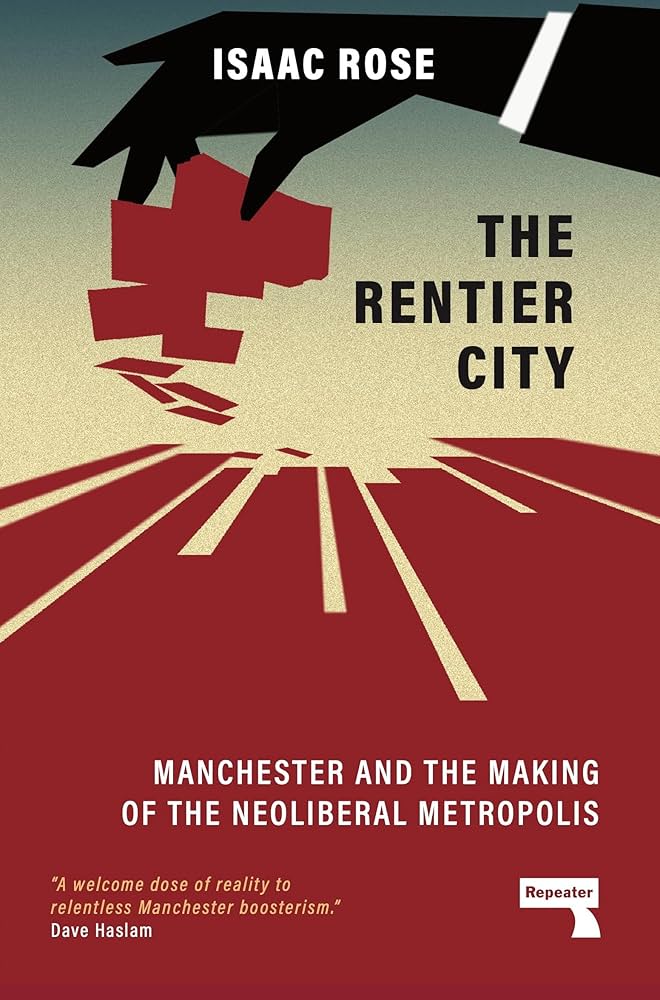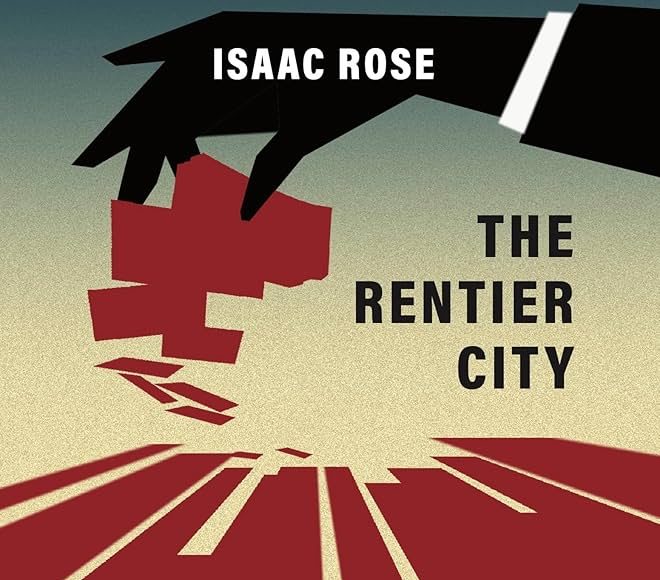The Rentier City: Manchester and the Making of the Neoliberal Metropolis by Isaac Rose, Repeater Books 2024, £14.99 paperback, 316 pages.

This book is an interesting history of Manchester, in particular of housing provision in the city. However, while it is a well-researched, erudite, anecdotal essay, it lacks a serious theoretical framework.
The book has three parts. The first, from c.1750 to 1950, is about the ‘shock’ of the industrial revolution and the development of the ‘built environment’ by private speculation. The second, which author Isaac Rose calls ‘the interregnum’, is about ‘the disintegration of the post-war consensus’ in the 1970s and 1980s and the ‘victory of neo-liberalism’ and the defeat of the ‘New Urban Left’ by the ‘New Right’. The final part describes the ‘reintegration’ of Manchester’s economy into what Rose calls ‘the secondary circuit of global capital’ in this century.
Rose claims that the landlordism of Engel’s time was ‘euthanised’ by ‘vigorous social reform’ but has now made an unwelcome return in the forms of build-to-rent, purpose-built student accommodation, houses of multiple occupancy, Airbnbs, Private Finance Initiatives and so on. He isn’t against capitalism as such, just in its form as rent outside state control in the hands of landlords and speculators. In The Housing Question Engels, writing about a follower of the petty-bourgeois anarchist Pierre Joseph Proudhon (1809-1865), says, ‘And now our Proudhonist [Mulberger] comes along and believes that if we were to forbid one single sub-species of capitalists … to receive profit or interest it would be a step forward!’ This might as well apply to Isaac Rose.
In Rose’s terminology the ‘primary circuit’ is the production of commodities and the extraction of surplus value. The ‘secondary circuit’ is ‘investments in the built environment or urbanisation’. Capital switches from one circuit to the other during crises of profitability in the sphere of production, but what causes these crises he doesn’t say. He cannot recognise the inherent tendency of the rate of profit to fall, which is the Achilles heel of the capitalist system as a whole. Rose recognises the part played by colonialism and the slave trade in the growth of capitalism in Britain but he shows no understanding of parasitism and imperialism, as if the ‘secondary circuit of global capital’ were a self-sustaining wealth creating machine unconnected to production processes elsewhere in the world. He is blind to the notion of a labour aristocracy of which he is a member. For him, anti-imperialism is just one of several ‘seditious’ isms that have swept across the city throughout the decades (p10).
In the first chapter Rose expresses admiration for Richard Cobden (1804-1865). Cobden was a mill owner from Sabden in Lancashire. He was a bourgeois Liberal free-trader who sought the support of the workers against the landed aristocracy for the repeal of the Corn Laws, offering them a double-sized loaf and a ten-hour working day but later reneging on his promises. Marx despised him as a ‘vulgar economist’ who had helped turn the disinterested inquiry of scientific bourgeois economy into ‘evil apologetic’. Manchester City Council have put his statue on a pedestal in Saint Ann’s Square because the first Labour MPs were elected by Liberal patronage, not by working class mandate. Labour’s ideological roots lie in reformist Liberalism and the labour aristocracy, not in the communist tradition. Rose is a supporter of the Labour Party. If like him you believe that socialism will come about by reforming capitalism, then you must sustain capitalism come what may.
Rose uses some of the language of Marxism but for decorative effect only rather than explanation. In mercurial style he repeatedly slips away into a mass of stories and extraneous detail that hide the wood among the trees. Not that in the end there is any wood to find. His one attempt at explanation comes on p239 where he eclectically borrows the concept of ‘rent gap’ from the Scottish geographer Neil Smith. ‘Rent gap’ is supposedly the difference between ‘actual ground rent’ and ‘potential ground rent’. The drive to close this gap explains ‘gentrification’. Rose pompously trumpets this trite observation as a ‘firm’ and ‘demystifying’ contribution to political economy. He also fancifully uses it to explain the gentrification of Paris by Georges-Eugène Haussmann in the 19th century that Engels had remarked on. Haussmann’s measures were all about crowd control. Lenin said it was ‘for the purpose of crushing workers’ insurrection’. And Marx: ‘Those long straight avenues … expressly opened to artillery fire’ rather than for creating the ‘Paris of the sightseer’ (Marx The Civil War in France).
In one of his asides, Rose gives a fair account (p132) of the Viraj Mendis Defence Campaign (VMDC) but its political significance escapes him. The VMDC showed that it is possible to build a broad-based, principled, anti-racist, anti-imperialist campaign that, whilst accepting office space and printing facilities from the Labour council, made no compromise with Labour politics.
Rose narrates in great detail the struggles of the Labour left for social housing against the Conservatives, Liberals and right-wing Labour in dramatic style: trench warfare, battle lines, young Turks, guerrilla struggle. The energy and commitment of people in the social and political movements who resisted the sell-off and privatisation of working class housing – by predominantly Labour councils – following the financial crisis of 2008/09 are seen as a backdrop of pressure from below in support of the real class struggle taking place in the council chamber and at the ballot box. As long as the struggles from below do not get out of hand and remain tragically defeated, Rose is happy to use them to give his narrative a spuriously radical air.
It is obvious that we need the state to build millions of council houses at social rent with no right to buy and no evictions. But which state will do this? Not the capitalist state that Rose supports. In 1891 Engels wrote, ‘people are accustomed from childhood to imagine that the affairs and interests common to the whole of society could not be looked after otherwise than as they have been looked after in the past, that is through the state and its lucratively positioned officials’. (Introduction to Marx’s The Civil War in France).
Rose cannot imagine the working class becoming the ruling class. In the end all he can do recommend (p273) a return to the Council chamber in support of Bev Craig as leader and Andy Burnham as Mayor, backed up from outside by ‘militant particularisms’. He does not succeed in his aim to provide ‘a new understanding of how the present condition came about’ (p12) If you are interested in local Mancunian history this is probably the only good reason for buying the book.
Peadar O Loinsigh




